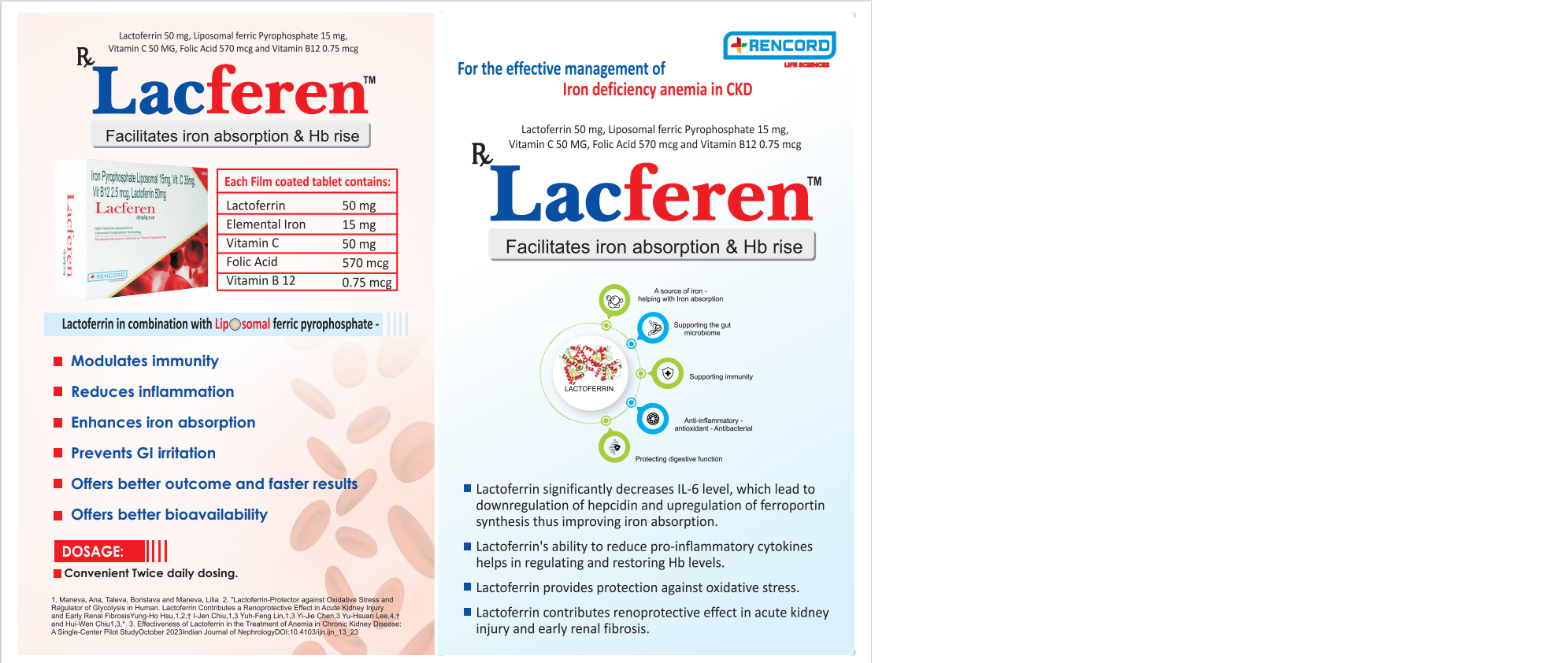Lacferen
Lacferen is combination of Liposomal Ferric Pyrophosphate 15 mg & Lactoferrin 50 mg supplement aimed at addressing anemia, particularly in patients with chronic kidney disease (CKD). This combination leverages the benefits of enhanced iron delivery and absorption, along with the unique properties of lactoferrin.
Composition:
Liposomal Ferric Pyrophosphate: 15 mg
Lactoferrin: 50 mg
Usefulness of Lactoferrin in CKD-Induced Anemia:
Lactoferrin is particularly beneficial in the context of CKD-induced anemia for several reasons:
1. Enhanced Iron Absorption:
o Lactoferrin binds to iron and facilitates its absorption in the intestines, helping to improve iron status more effectively compared to non-protein-bound iron supplements.
2. Anti-inflammatory Properties:
o CKD patients often suffer from chronic inflammation, which can hinder iron metabolism and erythropoiesis. Lactoferrin's anti-inflammatory effects can help reduce this inflammation, thereby improving iron utilization and red blood cell production.
3. Immune System Support:
o Lactoferrin has immunomodulatory properties that can support the immune system, which is particularly beneficial for CKD patients who are at higher risk of infections.
4. Antimicrobial Effects:
o Lactoferrin's antimicrobial properties help reduce the risk of infections, a common complication in CKD patients, which can further contribute to improved overall health and reduced anemia.
5. Synergistic Effect with Iron:
o When combined with iron supplements like liposomal ferric pyrophosphate, lactoferrin enhances the overall efficacy of the treatment by improving iron absorption and reducing the gastrointestinal side effects typically associated with iron supplements.
Mechanism of Action:
Liposomal Ferric Pyrophosphate:
Iron Supplementation: Ferric pyrophosphate provides elemental iron necessary for hemoglobin synthesis and red blood cell production. Encapsulation in liposomes enhances bioavailability, reduces gastrointestinal side effects, and targets iron delivery more efficiently to the sites where it is needed.
Lactoferrin:
Iron-Binding Glycoprotein: Lactoferrin is a multifunctional protein with a high affinity for iron. It enhances iron absorption by binding to iron and facilitating its transport across the intestinal mucosa. Additionally, it helps to reduce inflammation, supports immune function, and has antimicrobial properties.
Indications:
CKD-Induced Anemia: This combination is indicated for the treatment and prevention of iron deficiency anemia in patients with chronic kidney disease. CKD often leads to anemia due to reduced erythropoietin production, iron deficiency, and chronic inflammation.
Dosage:
The typical dosage is two tablets daily or as prescribed by a healthcare provider. The exact dosage may be adjusted based on the patient's iron levels and response to treatment.
Side Effects:
Common Side Effects: Gastrointestinal discomfort, nausea, constipation, diarrhea.
Serious Side Effects: Allergic reactions, although rare, may include rash, itching, swelling, severe dizziness, and trouble breathing.
Precautions:
Iron Overload: Monitor for signs of iron overload, especially in patients receiving other forms of iron supplementation.
Allergies: Assess for any history of allergy to lactoferrin, dairy products, or any other components of the medication.
Pregnancy and Breastfeeding: Discuss safety during pregnancy and lactation with a healthcare provider.
Contraindications:
Hemochromatosis or other iron overload conditions.
Known hypersensitivity to ferric pyrophosphate, lactoferrin, or any other ingredient in the formulation.
Drug Interactions:
Antacids and Calcium Supplements: These can reduce iron absorption and should be taken at different times.
Other Iron Supplements: Concurrent use should be avoided to prevent excessive iron intake.
Certain Antibiotics: Iron can interfere with the absorption of tetracyclines and quinolones.
Monitoring:
Iron Levels: Regular monitoring of serum ferritin, transferrin saturation, and hemoglobin levels is essential.
Kidney Function: Regular monitoring of kidney function tests in CKD patients.
Inflammation Markers: Monitoring for inflammation, as it can affect iron metabolism and erythropoiesis.
Patient Advice:
Take the medication with food to reduce gastrointestinal discomfort.
Maintain a diet rich in iron but avoid excessive intake to prevent iron overload.
Stay hydrated and follow any dietary recommendations provided by the healthcare provider.
Report any unusual symptoms such as severe gastrointestinal distress, signs of allergic reactions, or symptoms suggestive of iron overload to a healthcare provider.
Packaging
1x10x10 Monocarton

